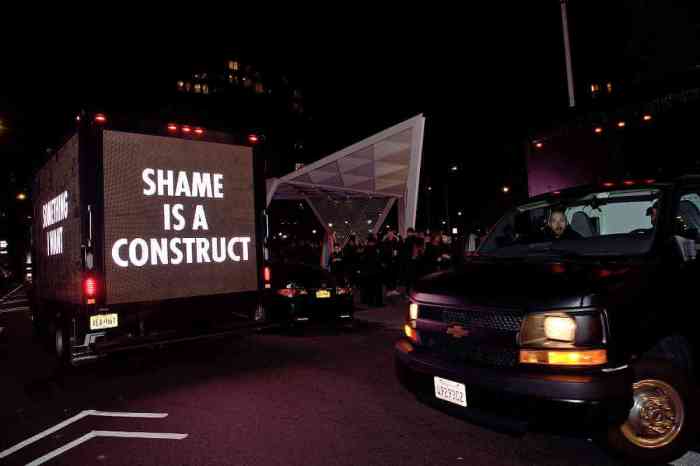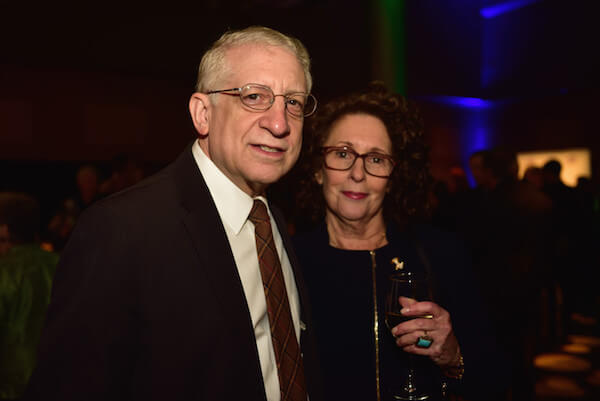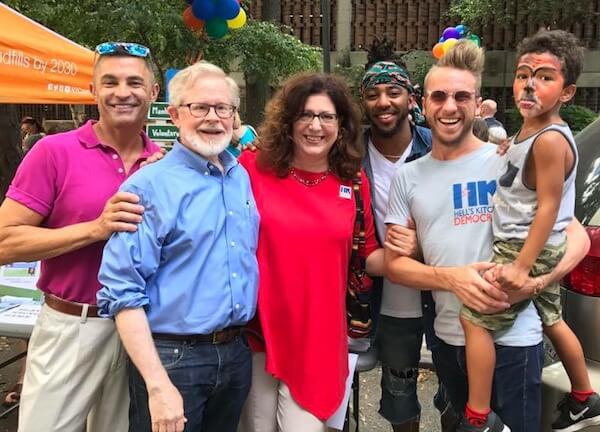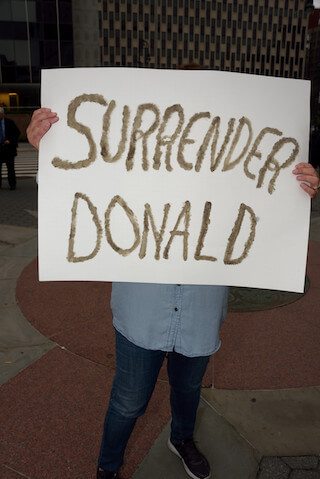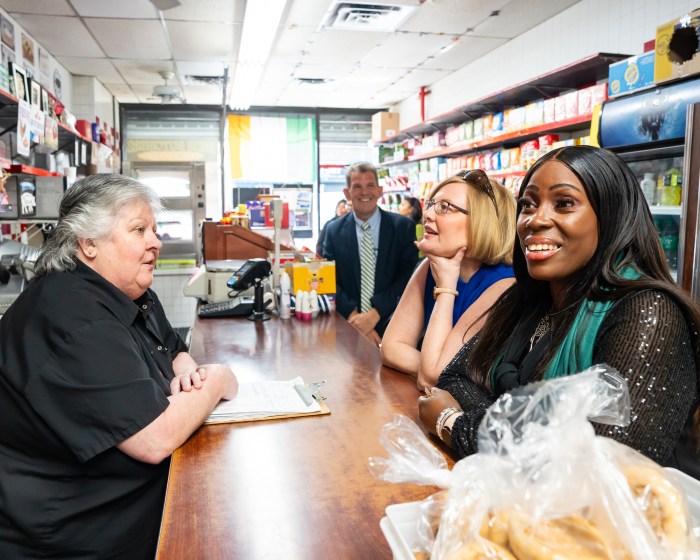ILLUSTRATION BY MICHAEL SHIREY.
Less than five weeks out from the September 10 Democratic mayoral primary, no candidate appears poised to reach the 40 percent threshold allowing them to avoid an October 1 runoff — an inconvenience that could divert valuable energy and money from the general election contest against the Republican nominee.
With the exception of several weeks in which former Congressman Anthony Weiner was riding high, the frontrunner position has been owned, since polling began in earnest, by City Council Speaker Christine Quinn, who, if elected on November 5, would be New York’s first woman and first out lesbian or gay mayor.
But finishing first in a primary is no guarantee of victory if a runoff is required, as then-Bronx Borough President Fernando Ferrer learned in 2001, nor, as 20 years of Rudy Giuliani and Michael Bloomberg have shown, does claiming the Democratic nomination carry with it the keys to Gracie Mansion.
The scramble for September 10
One proxy for Quinn’s ability to build on her longstanding advantage in the race after September 10 is the depth of her support in her natural base in Lower Manhattan and in the LGBT community citywide. On both fronts, her opponents have been unwilling to cede her that turf.
Each of the five most prominent candidates in the primary contest — former Comptroller Bill Thompson, Public Advocate Bill de Blasio, Comptroller John Liu, Quinn, and Weiner (all of whom, except Weiner, have sat down with Gay City News, NYC Community Media’s publisher, and the editors of the company’s other publications) — has convincingly demonstrated fidelity to gay community goals over the course of their career. No doubt that reflects a political fact of life here in New York City — that the time is long past when LGBT Democrats were on the margins of their party.
That is not to argue that Quinn does not maintain clear advantages — a career, dating back nearly a quarter of a century, in the thick of LGBT politics; her ability as Council speaker, which her opponents lack, to produce identifiable deliverables to meet community needs; and, leaving nothing to chance, her decision, alone among contenders in the field, to make new policy proposals during the campaign to address unresolved challenges for LGBT New Yorkers.
John Liu and Christine Quinn at a March debate sponsored by the city's LGBT Democratic clubs. | DONNA ACETO
Many gay voters, of course, will look to a broader palette of issues in choosing their candidate, and in a community that, at least in New York, has a strong tradition of progressive politics, the central charge dogging Quinn in this year’s race — that she has strayed from that tradition — is not insignificant. In candidate forums over the past eight months, her opponents have rarely missed opportunities to hit her on that score — on issues from Bloomberg’s third term to real estate development, the demise of St. Vincent’s Hospital, retaining Police Commissioner Raymond Kelly, and social justice legislation like paid sick leave.
The attacks on Quinn are tied to specific decisions she has made about how to work with the mayor as well as powerful interests outside of government, but they also reflect the reality of her position within the city’s power structure. As Council speaker, she is undeniably a City Hall insider in a way that a comptroller, a public advocate, or a member of Congress doing their work in Washington never could be.
Perhaps Quinn’s chief virtue as a politician is that she is an unapologetic insider. In response to hostile volleys from opposing candidates and to aggressive questions from reporters, she has consistently displayed a muscular defense of her eight years as speaker. If her arguments have not always held sway with audiences, she has never left doubt about her command of key policy issues facing the city.
Not that any of the other Democratic contenders have shown themselves to be slouches on policy details. At a March debate sponsored by five LGBT Democratic clubs, every participant displayed conversance with a broad array of issues the gay community cares about. They were all aware that the Bloomberg administration has shifted dollars away from HIV prevention toward testing and earlier treatment, even as new infections among gay and bisexual men continue to inch up. They supported baselining budget dollars for homeless youth housing, capping rents for people with AIDS who require government assistance, ending the use of condoms as evidence in prostitution arrests, and easing procedures for transgender people born in the city who wish to change the gender designation on their birth certificate.
Bill de Blasio at the March debate. | DONNA ACETO
The four candidates opposing Quinn did not suddenly come to their knowledge about LGBT issues on the eve of a debate. As New York has cleared a number of hurdles in recent years — enactment of a state gay rights law, a city transgender rights ordinance, a school anti-bullying program out of Albany, and marriage equality — each of the Democratic contenders was an ally.
As an aide to Mayor David Dinkins, de Blasio was on the task force that developed the mayor’s executive order regarding domestic partnership for city workers. Half a dozen years later, the Brooklyn community school board he sat on was among the first in the city to ban the Boy Scouts from meeting in schools due to their discriminatory policies. On the City Council, he chaired the General Welfare Committee that oversees the city’s efforts in meeting the housing and social service needs of people living with AIDS.
As comptroller, both Liu and Thompson, leveraging the massive pension funds they controlled, continued their office’s leadership role in the nationwide shareholder movement to demand nondiscrimination and workplace equity for LGBT employees of publicly traded corporations.
In 2007, Weiner was one of only seven House Democrats who voted against the Employment Non-Discrimination Act because the version that made it to the floor that year lacked job protections for transgender workers.
Quinn’s LGBT portfolio, of course, is considerably deeper. As chief of staff to Tom Duane when he served on the City Council, she was a leading player in the pushback against Mayor Rudy Giuliani’s efforts, initially, to eliminate and, later, weaken what is now called the HIV/ AIDS Services Administration; she worked with Duane on the city’s first domestic partnership legislation, which Giuliani eventually rewrote and claimed credit for; and she was a public face in the fight against the Reverend Ruben Diaz Sr., an implacable foe of the LGBT community, holding a seat on the Civilian Complaint Review Board, an NYPD watchdog body.
After leaving Duane’s office, Quinn ran the New York City Gay and Lesbian Anti-Violence Project for several years before winning his seat in early 1999 when he moved on to the State Senate. Prior to becoming speaker, Quinn was often an antagonist of Bloomberg’s, advancing legislation the mayor later vetoed — and was overridden on — to require contractors doing business with the city to provide non-discrimination protections and to implement anti-bullying programs in the public schools. When the Council lost its legal challenge to the mayor’s refusal to implement the contractor law at the state’s highest court during her first days as speaker, Quinn’s counsel advised her that taking Bloomberg to court for similarly refusing to put the bullying program in place was futile.
Bill Thompson at the LGBT debate in March. | DONNA ACETO
Quinn clearly adopted a more accommodating posture toward the mayor after assuming the speakership, but has at times sparred with him on LGBT questions. As his budget has repeatedly cut funding for homeless youth shelter — an approach Andrew Cuomo has followed since becoming governor — she has backed General Welfare Chair Lew Fidler’s push to get the money back into the budget. Quinn has publicly argued with Bloomberg’s health commissioner, Dr. Thomas Farley, over who has the greater responsibility for reductions in HIV prevention efforts. And she has challenged the mayor over his opposition in Albany to rent cap legislation for people with AIDS and criticized the police department for its wave of false arrests several years ago of gay men in adult video stores.
But last year, she and Kelly, the police commissioner, announced major changes in procedures spelled out in the department’s Patrol Guide for interacting with arrestees who are transgender, reforms hailed by advocates.
Quinn has also butted heads with activists at times, including an ongoing battle several years ago with AIDS advocates, led by Housing Works, who demanded that the city entitlement to housing support be expanded from those living with AIDS to anyone who is HIV-positive, an idea the speaker rejected as “radical.”
But in this year’s campaign, Quinn is the only candidate to have announced new LGBT-specific policy pledges — to roughly double city spending on homeless youth beds in order to eliminate a nightly waiting list of about 350 and to use money from the capital budget to fund construction of a senior housing facility tailored to meet the needs of LGBT elders.
Not surprisingly, the speaker remains the favorite among LGBT institutional leaders, winning endorsements from the Stonewall Democrats, the Gay and Lesbian Independent Democrats, and Brooklyn’s Lambda Independent Democrats, as well as the Empire State Pride Agenda and the Human Rights Campaign.
Her opponents, however, have made inroads. Thompson won the nod from the Jim Owles Liberal Democratic Club. Liu, who had strong LGBT support in his 2009 election as comptroller, was endorsed by the Lesbian and Gay Democratic Club of Queens, his home borough but, more significantly, the home club of Daniel Dromm, one of Quinn’s three out gay and lesbian colleagues on the Council. Liu also snagged surprise victories in three downtown Democratic clubs, including the Village Independent Democrats, centered in the heart of the speaker’s district.
De Blasio, who was also an LGBT favorite in his 2009 race for public advocate, has gained endorsements from a variety of well-known gay and lesbian arts and cultural figures, including Cynthia Nixon, Alan Cumming, Charles Busch, Stephen Spinella, and Michael Musto. At a May 12 LGBT campaign event for de Blasio at the Cutting Room, the loudest complaints about Quinn focused on her decision in 2008 to allow a Council vote on changing the city’s term limit law so that the mayor — and the speaker — could seek another four years in office and about her ties to the real estate industry.
These are both standard talking points from de Blasio himself, who has distinguished himself as Quinn’s toughest critic in the race. When de Blasio spoke to NYC Community Media editors about the closing of St. Vincent’s Hospital, he faulted the mayor for “turning his back” on the problem, noting “he did not feel accountable to anyone… He had his third term.” Quinn, the Council member representing the district where St. Vincent’s was, he said, “wasn’t willing to challenge that.”
Criticizing what he described as the failures of the mayor’s affordable housing record, de Blasio said, “When the legacy of Bloomberg is written, it will be that there was extraordinary lenience toward the real estate industry. That a huge amount of public value was transferred” to private interests. He added, “When it comes to development, the Bloomberg world and the Quinn world are one unit. Quinn has never substantially separated from Bloomberg on development.”
The speaker pulls no punches in responding to charges like these about her ties to real estate and her role in the St. Vincent’s closing.
“I have a very long record that I am proud of working with communities and with my colleagues to support responsible development,” she said. “With all due respect to the public advocate, for him to take the entire record of the City Council and cast it in the shadow of Mike Bloomberg is disrespectful of the 51 members.” She noted that de Blasio spent eight years on the Council, “four of them in the leadership.”
On St. Vincent’s, she laid the blame squarely on the hospital’s board of directors, whose fatal error, she said, was in terminating an intern and residency program that provided significant Medicare and Medicaid reimbursements and could have made it an attractive asset for Mt. Sinai Hospital to take over. With that decision, the hospital “slit its own throat and let itself bleed out.” Charging the hospital’s leadership was not upfront about the financial hole it was in, Quinn said, “It could have been saved if they didn’t lie.”
On term limits, Quinn is more circumspect, adopting the posture typically taken by the mayor. Voters were given a choice in 2009 and decided to keep the mayor for another four years. She does not mention that when the term limit question came up in late 2008, a recent scandal over a slush fund run out of the speaker’s office made her own mayoral prospects the following year unpromising.
With Weiner’s recent tumble in the polls, de Blasio is showing strength he has not evidenced previously in the race. His campaign took a major hit earlier this year when Quinn reversed her longstanding resistance to paid sick leave legislation and grabbed away one of his major issues. Her opponents piled on her in the LGBT debate in March — shortly before she changed course — demanding that she stop blocking a floor vote on a measure that enjoyed a veto-proof majority.
When she announced her support for a modified sick leave bill, de Blasio immediately faulted her for delivering too little, too late, but the optics of the moment didn’t favor him. In front of City Hall, she was surrounded by labor leaders and other social justice advocates. Several hours later, the public advocate stood alone in the same spot to deliver his critique.
Another major issue that creates fireworks for Quinn when she appears before progressive audiences is her repeated statements she would happily retain Kelly as police commissioner if she were mayor, a position her opponents all repudiate. The speaker has walked a very fine line in the controversy over police-community relations and the widespread use of stop and frisk tactics in communities of color. Last summer, she was among the LGBT leaders who threw in their lot with a Father’s Day march against stop and frisk in Upper Manhattan, even as she was exchanging collegial letters with Kelly about internal reforms of police procedures.
This year, she endorsed a package of police reform legislation, including the establishment of an inspector general bitterly opposed by Bloomberg and Kelly. At the same time, she declined to support one bill in that package that would allow lawsuits over allegations of profiling based on categories including race, ethnicity, sexual orientation, and gender identity. In the wake of Bloomberg’s veto of the entire package, however, Quinn said she would allow an override vote to go forward on all of the bills, including the profiling measure.
On numerous occasions, the speaker has spoken out strongly against levels of NYPD stops and frisks that in recent years approached 700,000. Asked why her statements do not disqualify Kelly from consideration as commissioner, she lauded his crime fighting record and said, “He has implemented, I believe, the plan as his boss has told him to do it.” As her commissioner, she said, he would implement a different policy.
“There’s a fundamental challenge to how some folks view government,” Quinn said. “People seem to think you have to agree all the time to work together. That’s not life.”
None of her opponents share her faith that Kelly would carry out their mission if they were mayor, but beyond that there is little that unites the Democratic field on a specific approach to reform. Liu and de Blasio are the most ardent NYPD critics. The stop and frisk record under Bloomberg, the comptroller charged, reflects a police culture built on “production measures,” or as he termed them “quotas” and “targets.” Liu would scrub the current leadership of the NYPD, but sees no value in installing an inspector general.
De Blasio is similarly critical of the NYPD’s stop and frisk record but supports the full package of reforms currently awaiting a Council override vote. The public advocate frequently names Kelly as someone in need of replacement to underscore Quinn’s support for him.
The toughest candidate to pin down on police-community relations, however, is Thompson. Early in the campaign, he offered a nuanced critique of the NYPD on stop and frisk. He said the tool had been excessively used but relied on his authority as the only African American in the race to point out that communities of color, many of them struggling economically, are in greatest need of good policing. He sounded reluctant to risk tying the NYPD’s hands. As many black and Latino Council members pressed to move the police-community relations legislation forward, Thompson declined to offer his support.
Yet, in a recent appearance before a black congregation, the former comptroller, pointing to the killing of Trayvon Martin in Florida and George Zimmerman’s acquittal on murder charges in that case, amped up his critique of the NYPD. Meeting with NYC Community Media editors the following day, he used terms Liu has often applied — “targets” and “quotas” — in describing the abuses of stop and frisk.
Then, taking direct aim at Kelly, he said, “The reason it has gone wild is that the mayor has deferred to his police commissioner.






























